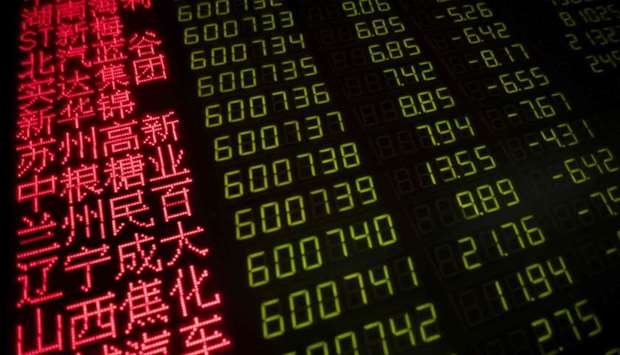Shanghai stocks suffered their worst day in more than three years on Monday after US President Donald Trump said he would raise tariffs on imports from China at the end of this week, dealing a blow to hopes of an imminent end to their trade war.
The benchmark Shanghai Composite Index sank 5.58 percent, or 171.88 points, to 2,906.46, while the Shenzhen Composite Index, which tracks China's second exchange, plummeted 7.38 percent, or 120.79 points, to 1,515.80.
Shanghai's decline was the worst in a single day since late February 2016.
In Hong Kong, the Hang Seng Index plunged 3.03 percent, or 912.43 points, to 29,169.12 in the afternoon.
The Chinese losses were the biggest in an Asia-wide sell-off triggered by Trump's tweeted announcement that tariffs on $200 billion of imports from China would rise on Friday, an apparent bid to pressure Beijing to reach a deal on their trade disputes.
It casts a shadow over the next round of talks set for Washington this week, but while Bloomberg News and the Wall Street Journal reported Beijing was considering delaying the meeting, an official said negotiators were still planning to attend.
China's yuan currency also suffered, losing 1.3 percent at one point -- its heaviest drop for three years -- before recovering somewhat in the afternoon to 6.7976 to the dollar, down 0.92 percent.
Trump stoked "risk aversion and panic emotions" in markets, said Qian Qimin, an analyst with Shenwan Hongyuan Securities in Shanghai.
Qian said Chinese shares could fall further in coming days but "should stabilise soon".
"The additional tariffs, if imposed, may not have much impact in the short term since the government can use policies to offset this," he said.
Securities shares were among the biggest losers. CITIC Securities and First Capital Securities both dropped by the maximum allowable 10 percent to close at 20.74 yuan and 6.34 yuan, respectively.
As markets opened on Monday, China announced the latest in a blizzard of piecemeal pump-priming measures implemented this year to shield its economy and markets.
The People's Bank of China said beginning May 15 it would cut the amount of cash that small rural banks must hold in reserve, aiming to spur lending.
The move will unlock 280 billion yuan ($41.6 billion) for lending to small private companies, the central bank said.
China has loosened monetary policy and employed a range of stimulus measures this year after markets tanked in 2018 due in part to the trade tensions.
As a result, the Shanghai index rose around 30 percent from the start of this year to mid-April.
But recent hints that China may curtail further stimulus to prevent markets overheating have contributed to an index fall of around 10 percent in the past three weeks.
Among other companies, telecoms operator China Unicom plummeted 9.15 percent to 6.06 yuan and telecoms manufacturer ZTE fell the maximum 10 percent to 28.94 yuan.
Liquor giant Kweichow Moutai lost 6.98 percent to end at 906.00 yuan and Yanghe Brewery finished 7.44 percent lower on 108.91 yuan.
Individual retail traders, who drive much of the trading volume on Chinese exchanges, anxiously watched a price board at a Shanghai brokerage on Monday, with some venting over Trump's comments.
"I expected the market would fall but not by so much," said a 77-year-old retiree who gave only her surname, Wang.
"I'm very annoyed. I've lost at least five percent. I have no choice but to pray for new measures from the government today."

Stock price movements are seen on a screen at a securities company in Beijing
